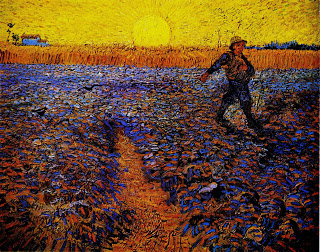 Parables,
Parables,  Van Gogh,
Van Gogh,  fruitfulness
fruitfulness  Friday, March 11, 2016 at 02:22PM
Friday, March 11, 2016 at 02:22PM  Plain, but subtle: Jesus told an unadorned story filled with great wisdom, a story so important he asked, “Don’t you understand this parable? How then will you understand any parable?” Every Sunday school child knows this story by heart. Van Gogh painted it three different ways. Churches have invested untold fortunes to preserve the tale in stained glass. Jesus even took time to explain the story, so we think we get it. But hearing one answer is not the same as living all the answers.
Plain, but subtle: Jesus told an unadorned story filled with great wisdom, a story so important he asked, “Don’t you understand this parable? How then will you understand any parable?” Every Sunday school child knows this story by heart. Van Gogh painted it three different ways. Churches have invested untold fortunes to preserve the tale in stained glass. Jesus even took time to explain the story, so we think we get it. But hearing one answer is not the same as living all the answers.
When Jesus taught in parables, he led with the Parable of the Sower. Whether you read in Mathew (13), Mark (4), or Luke (8), Jesus put this story first. His disciples asked for an explanation, but I think the Lord gave us only the broadest brush strokes of his meaning. I think he invited us to meditate on his simple sketch and discover layer upon layer, meaning upon meaning. Perhaps he wanted us to fill in the details. What if his story is the rough draft and our lives are the finished work? Woe to us if we think of this parable (or any parable) as a story with only one meaning. One sower, four soils, and countless seeds yield ten thousand permutations.
Consider the possibilities. Who is the sower? Why did Jesus use the metaphor of a seed? And why is the sower so careless with the seed? (Or is he?) How should the soil be prepared? Who should do it? How can it be done? The best teacher is not the one who answers a few questions, but one who suggests questions capable of changing your life. Each question gives way to an hour of meditation. Each meditation is a chance for the Spirit to speak.
For example, I began to ask questions of this parable. Why does Jesus describe the harvest from good soil as 30, 60, or 100-fold? What does God expect of me? How can I know whether I’m growing into my full potential as a disciple of Jesus? In short, what is the meaning of a fruitful life?
I began to see that my faith took root in the soil of the North American church, which (like all churches) is a mix of influences both godly and worldly. We are a people who prize action and effort. We judge results quarterly, monthly, and sometimes daily. Our cell phones can give us “market updates” refreshed by the minute. We are not farmers; we are capitalists. Results matter, and they matter now. You either produce results or the boss will get someone who will. Whether you earn minimum wage or Wall Street rewards, you’re only as good as the profit you’ve produced at the end of the day. But God is no capitalist; he is the wise steward of creation. He is the Sower of an imperishable seed.
I was challenged to understand what the sower expected, and when he wanted it; I was challenged to ask what fruit I had grown; and I was challenged to consider when the harvest comes. From my meditation I found great peace in this one idea: my life could (by his grace) produce 30-fold fruitfulness. What if—across the years of my lifetime—I could impact 30 other people with the word of the Kingdom? As I asked these questions pressures of North American life began to fade away. The marketplace pace of modern “ministry” gave way to the unforced rhythms of grace.
I began to see that in a lifetime of 80 years I could “afford” to invest deeply and patiently in the lives of others, without demanding an immediate return. I began to see the wisdom of God in the beauty of the seed and its slow decay. I began to welcome the good news that I did not need to abide alone but that by dying to self there was much fruit ahead. And most warmly, I began to welcome the harvest of my life: my spouse, my children and grandchildren, my neighbors and community. I found contentment that his parable could well be a promise, the promise of a 30-fold life, at the very least.
Reader Comments